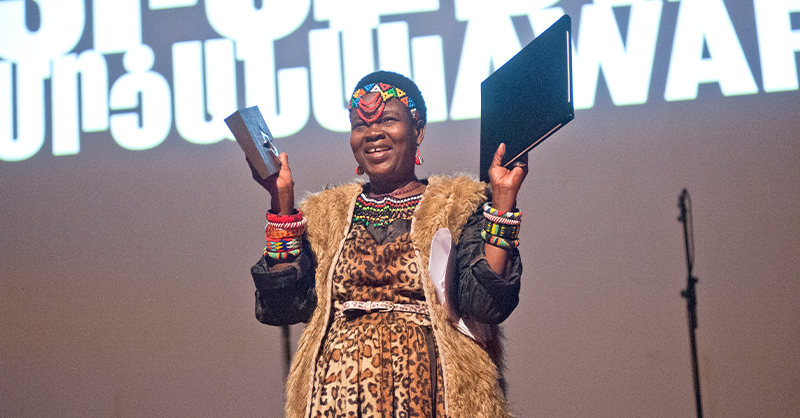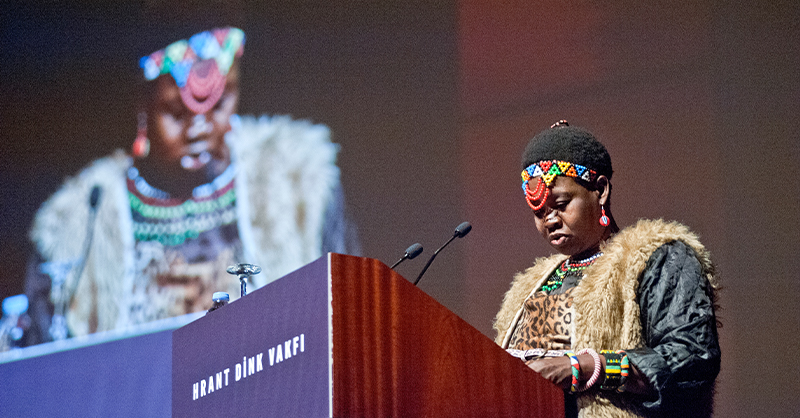
Theresa Kachindamoto was born into a traditional tribal family, the youngest of twelve siblings, in the small southeast African country of Malawi. For twenty-seven years she worked as a secretary at a city college in the city of Zomba. In 2003, she was called as a candidate in elections within her 900-member tribe because she was “good with people;” and winning the election, she became senior chief.
When she moved from the city to the region where her tribe lived, she was shocked to see twelve year-old girls with babies married to teenage husbands. In a country where half of girls are married off because they are an economic burden to their families, she launched a concerted effort to solve this problem from the moment she assumed her duties.
She first took on the issue of “marriage camps” where young girls were being sent for kusasa fumbi (cleansing). Reportedly, the sexual initiation in these camps consisted of traditional rituals that focused on “how to please their husbands,” which was in reality sexual abuse. Some girls were forced to engage in sex with their teachers in order to “graduate,” causing lifelong trauma; and in a country where one in ten people had HIV and protection was rarely if ever used, such initiation rituals caused early deaths.
She insisted that girls throughout the country should avoid these “marriage camps” and continue their education. Though several families said that a tribal chief with five sons had no right to teach them how to raise girls, she continued her fight. She banned the marriage camps in her region, and convinced the chiefs of fifty tribes to abandon traditions that encouraged early marriage. In 2015 she dismissed four regional tribal chiefs who continued the practice of child marriage despite the change of national law on the issue, and forbade their return to duty until they agreed to obey the law.
She continued her work, speaking with various NGOs as well as meeting one-on-one with members of her tribe, mothers, teachers and religious leaders. She has successfully had early marriage prohibited in the country’s family law. Thus far she has 850 child marriages annulled, allowing child brides and husbands to continue their educations.
This woman tribal chief working for children’s human and educational rights is also striving to overcome the economic difficulties that lead to early marriages. She is having a fund created to pay the tuition for daughters of poor families, and encouraging efforts to strengthen children’s bonds to school life.

13 years ago I was chosen to succeed my late brother as Chief of the Dedza District of Malawi. I want to tell you my story of trying to change one of the traditions within Malawi’s culture that I really did not agree with. I wanted to try and reduce the practice of marrying of young girls and boys against their wishes.
I had spent 27 years living away from my home district, working in Zomba at the Theological College as a College secretary. I did not expect to have to move home and take on a role that I had no experience of. When the call came, I was reluctant; though compelled to honour my duty I accepted the position and was duly appointed by the former President Dr. Bakili Muluzi.
One day, shortly after moving back to my home district in the central Region of the Country, I met a young girl who was carrying a baby, I suggested she should take the baby back to her mother, and I was surprised by the girl’s response “I am his mother”.
She then pointed to the father of the baby, a boy playing football not far from us. She told me that she was 13 years and the boy was 14 years.
I was shocked and saddened.
How was this young girl going to continue in school, or be allowed to mature at a normal rate, if burdened by marriage and a baby at such a young age?
My heart told me to help this young girl and my head told me this is not the way to ensure long term success for our country if our young women and men were going to grow up like this.
I decided to try and do something about this issue and I started by undertaking a lengthy process of research to make sure that I understood the problem and maybe could find some way forward.
This is not an easy issue to confront. For many people it sits as a core part of Malawi’s traditions and beliefs and is therefore encouraged in some areas, particularly in the area where I was chief.
There are real economic drivers that pose difficult decisions for parents who are struggling to pay school fees. An arranged marriage for their daughters can bring great wealth in the form of goats, cattle and money. A family in my village had married of two of their daughters in recent years and the ‘’dowry’’ (what they get from at the wedding) enabled them to survive, increase their farming stock and live comfortably.
Of course the consequences of these marriages are clear and sad. Girls drop out of school at an early, typically around the ages of 12 or 13. They are forced to have sex with their husband- who is often much older man. They have to give birth whilst still physically developing and un-prepared by nature of childbirth. And of course they become trapped into a marriage at a young age- before they have had a chance to make their own choices about their future.
It is also common for husbands to seek a new, much younger wife, when the first one has aged.
This is not the life I wish for the next generation of Malawi girls and boys. I demand more, so much more.
The analysis conducted by myself and other stakeholders gave us a clear path to follow.
All parties involved in a community needed to be fully briefed on the dangers and consequences of child marriage, to try and move people away from their long held beliefs that this practice was ok.Then we had to move for a change in the by-laws to make the practice illegal, giving us clear mandate to punish those that officials these unjust marriages. I briefed many communities, MPs, councillors, faith leaders, police officers, village headmen and women, youth groups, district education officials and countless parents. I went to meetings many day of the week; I travelled to many of the villages in my area. I had countless conversations with people of all ages.
We made some progress during that year.
Chiefs and religious leaders agreed that the legal age for marriage without consent was 18 years old and that all marriages must first seek their permission, authorized through their registry books.
Bylaws were created to give power to these local chiefs, who could now enforce the laws in their area. If a chief is found to have authorized the marriage of a girl under 18, then he or she is immediately dismissed. Up to now I have dismissed 4 of the chiefs in my area.
Of course, this is only part of the battle, as parents still need convincing that they should focus on education for their daughters and sons, rather than getting the benefits of sending them off for an early marriage.
Despite the challenges, and the significant opposition I have faced from communities and chiefs, so far we have terminated 549 child marriages, involving 377 girls and 172 boys.
I expect this number to rise to 1200 before the end of the year.
Some were as young as 12 years but all of the girls involved were under 16.
It has been difficult challenge for me to confront. I am proud to the work we have achieved so far, but there is a long way to go.
But all of this has come at a personal cost. Not only has this taken a great deal of my time, but some people have made trouble for me and I have received great criticism along the way.
I have 5 sons and no daughter myself and this has been cited as a reason that I do not understand what it is like to face these challenges in Malawi. People criticized me for what I am doing since I do not have any daughter.
But I have persevered and I will no doubt to have push against more of the old ways of thinking to achieve my ultimate goal of removing child marriage from Malawi and giving all girls and boys the opportunity to complete their education.
I am grateful for those that have joined me on this path. We have made progress for which I am grateful. But we still have a lot of work to do, for which I am prepared.
I hope many more people will link arms with me and fight for the rights of the girl child of Malawi.
May God Bless you all
Thank you.
